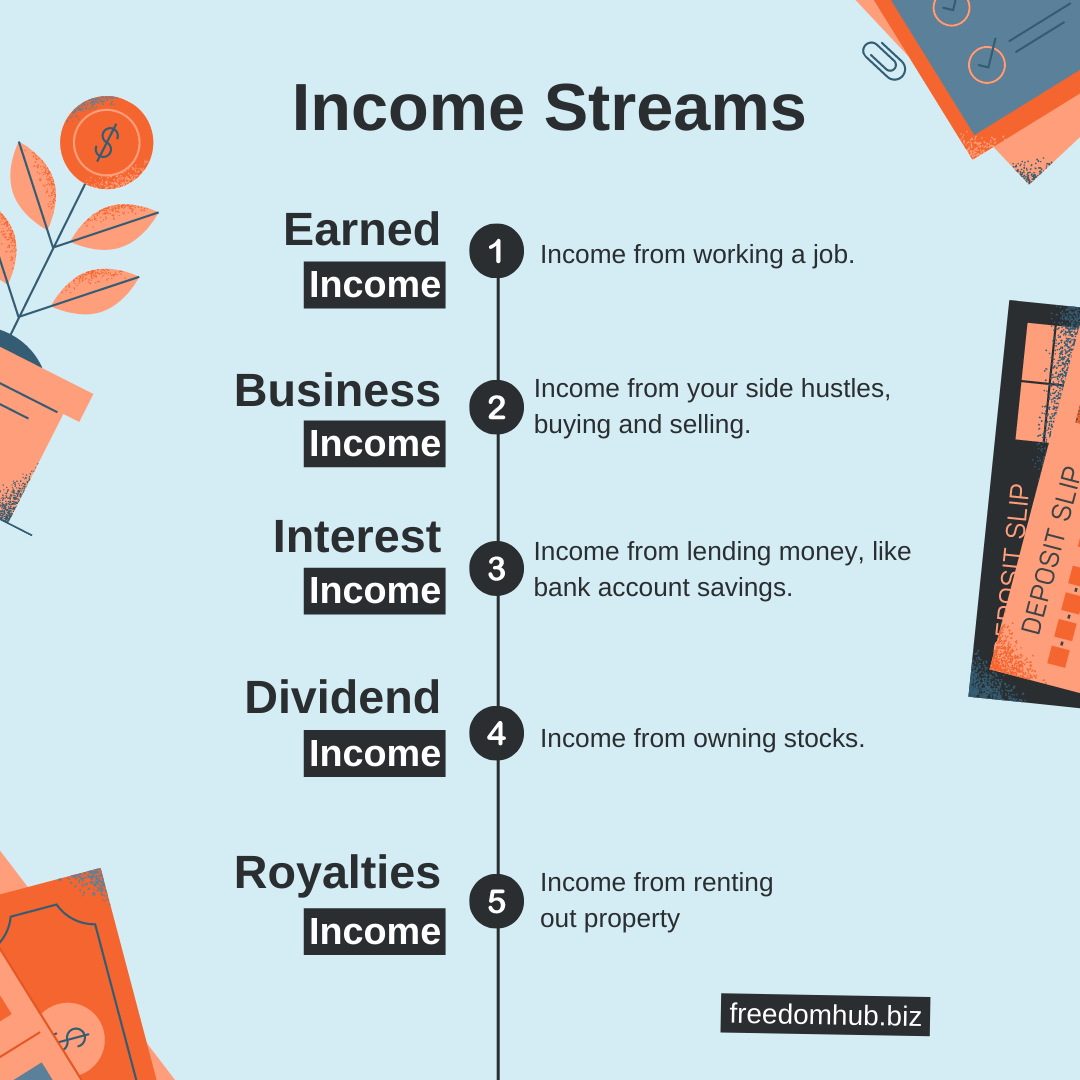Introduction

Recently, it was discussed how critical it is to save money. Saving money can help you prepare for financial emergencies, such as job loss or medical bills, as well as providing you with a cushion to make major purchases. Additionally, saving money can help you build a nest egg for retirement. Then we looked at managing your personal finances using a budget. Controlling your spending was also stressed. When it comes to necessities, however, it can be difficult to reduce expenditures further. We learn from the Bible that “Money wrongly gotten will disappear bit by bit; money earned little by little will grow and grow.” (Proverbs 13:11). Today we will be looking at creating multiple streams of income.
What do we mean by multiple streams of income?
Everyone needs income to survive in this world, which demands money for almost everything you need. Multiple streams of income refer to having multiple sources of income to draw from. This could include having a full-time job, freelance work, investments, or any other source of income. Having multiple streams of income allows you to diversify your income and reduce your risk of financial hardship. For instance, having multiple streams of income means that if you lose your full-time job, you still have other sources of income to rely on while you look for a new job. While having multiple streams of income is beneficial, it is not always possible for everyone. For some people, it may not be possible to find multiple sources of income, or they may not have the time to invest in multiple sources of income. Additionally, some people may not be able to take on the risk of investing in multiple sources of income. This is because there is always the potential for one or more of the sources of income to fail. It is true that having multiple streams of income can be beneficial as it provides financial stability and diversification. However, it is critical to note that it is not always feasible for everyone to pursue multiple sources of income. This is due to a variety of factors such as time constraints, risk tolerance, and available resources. Most people do not earn enough money, making them slaves living paycheck to paycheck.
I’m glad that you have learned about preparing a budget. The importance of a budget was highlighted. Having multiple sources of income can be a great way to help people out of this cycle and be able to save money for their future. Doing so requires careful planning and budgeting to ensure that all expenses are covered, and that the income from those sources is enough to cover the costs. The budget helps you spend within your financial capacity as there are limited financial resources. By following a budget, you can ensure that each expense is managed effectively and you can prepare for the future in a financially sound manner. While it is imperative to have a budget and to plan and save for future expenses, there are also times when it is appropriate to spend money. For example, if there is an emergency situation or an opportunity to make a large purchase that will save money in the long run, it may be worth investing more over budget in the short term.
As much as you can budget, at times you will find that you cannot remove some expenditure items. This is because you may find that they are actually what you need to survive. For example, rent or mortgage payments, insurance, food, and medical care are some of the basic necessities that you cannot remove from your budget. Even if you try to cut down on other items, these are the expenses that you will need to prioritize. So, what do we mean by multiple streams of income? This refers to getting money from different sources. Examples of different streams of income include salary or wages, side business, investment income, and others.
How do different income sources help?
It has been noted that depending on one source of income can present a number of challenges. In the case of salary, for example, it is something that does not grow frequently. When salaries remain stagnant for long periods of time, it can be difficult to make ends meet. Inflation can also take a toll on fixed-income sources, making it increasingly difficult to maintain a certain lifestyle. Sometimes, it gets cut. But the cost of living keeps on rising. That means that the value of money declines such that you now need more money to purchase the same goods you used to buy before. Therefore, other sources of income come in handy in such a situation.
These days, different companies are reducing their staffing levels. In other words, some jobs are lost. This creates an imbalance between the demand for goods and services and the amount of money available in the economy, leading to a decrease in purchasing power. As a result, people must find other ways to increase their income in order to maintain their standard of living. That is where multiple streams of income come in. This means building different sources of income is crucial. For example, people can diversify their incomes by taking on extra jobs, starting a side business, or investing in stocks and mutual funds.
As one grows older, there will come a time when he will no longer have the strength to engage in income-generating activities. Therefore, having multiple streams of income can act as a type of retirement plan. Passive income can help one sustain their lifestyle in their later years, since it’s not dependent on physical strength. Additionally, having multiple streams of income can ensure that should one stream dry up, there will be others to support one’s needs. This provides a level of financial security that can be invaluable in old age. Employees reach an age where they face forced retirement. The retirement benefits are usually not enough to keep a former employee in the same standard of living as before. Multiple sources of income can therefore supplement the income of an individual. Having multiple sources of income is like having a financial safety net; if one stream of income is cut off, you have the other streams to turn to in order to keep your financial life afloat.
This is especially true for individuals who are already retired and no longer have the opportunity to work in the same manner as they did before. Having multiple sources of income gives them options to fill any financial gaps left by their retirement or pension income. This way, they can stay financially secure and maintain their standard of living. Government scholarships are now on the decline, especially in my country. After finishing high school, they used to be very helpful to schoolchildren from poor backgrounds. Government scholarships are now on the decline because of budget constraints and other economic factors. This means that more people are relying on multiple sources of income, such as freelance work, part-time jobs, and investments, to make up for their retirement or pension income. This gives them more options to maintain their standard of living and stay financially secure. So, most of the parents now are expected to foot the bill at tertiary institutions for the education of their children. As a result, it is becoming increasingly difficult for families to provide their children with the education they need to succeed in life. This is because the cost of college tuition continues to rise. That is where multiple streams of income come in to assist.
Some examples of sources of income
There are many sources of income that one can consider. Below is a list of some of them:
1. Salary or wages
In this you sell your skills, expertise, and experience to be paid money. You are paid for the time spent doing a certain job. You are hired by an employer. The more competent and proficient you are at what you are doing, and the more difficult it is to replace you, the more you are rewarded. Many people fall into this category. In fact, the education system in many countries has been preparing learners to look for a job when they finish. This has also brought a challenge because the labour market gets saturated. For instance, competition for jobs is so high in some sectors that employers can be very picky and offer lower salaries than what the job is actually worth.
2. Commissions
In this you are given a percentage of the total sales that you make. You are rewarded for your efforts, and you have unlimited earning potential. This means that the more sales you make, the more money you will make. It also allows you to work on your own schedule, as you can work as much or as little as you want and still generate money. Thus, this setup not only provides an incentive for increased sales, but also offers flexibility, allowing you to take control of your own income. However, some people may prefer a more stable income, and may not be comfortable with the idea of their income fluctuating based on their sales. Others may not like the idea of working on their own schedule and may prefer the structure and discipline of a traditional 9-5 job.
3. Profits
This is when you own a business and reap the benefits of the money made from it. You are rewarded for the amount of risk you take and the effort you put into the business. Entrepreneurship is the process of designing, starting, and running your own business or enterprise. Individuals who are successful at entrepreneurship display many qualities, including creativity, risk-taking, determination, and perseverance. For example, some entrepreneurs have achieved success by developing a product or service that addresses an unmet need in the marketplace. However, many entrepreneurs have also found success by launching a product or service that is not innovative or does not address an unmet need in the marketplace. For example, some entrepreneurs have found success by launching a product or service that is similar to an existing product or service. However, it is cheaper or of higher quality.
4. Income as an independent contractor
A contractor is a person or company that provides services to another person or company under a contract. A freelancer is a self-employed person who works independently, often for multiple clients. Contractors and freelancers have the flexibility to choose which projects to work on, and when, and are usually paid a premium for their expertise. They both have the potential to earn more money than if they were employed by a single employer, and they frequently have the freedom to create their own schedules. For instance, a freelance writer may be able to make more money than a copywriter contracted by a single company. In addition, they may also be able to work more flexible hours. Moreover, contractors and freelancers are often in control of their own rates and can adjust them according to their skill level and the project requirements. This allows them to maximize their earning potential while capitalizing on their expertise. However, freelancers and contractors have to face a number of challenges that full-time employees don’t have to deal with. For instance, they may have difficulty finding steady work, and they may also have to deal with periods of unemployment between projects. They also don’t usually have access to the same benefits (such as health insurance and retirement plans) that full-time employees do.
5. Income from investments
Investing houses allow people and companies to earn interest on their money. An investment house is a bank or business institution that manages investments and offers related services such as brokerage, asset management, and asset planning. Investment houses help people and companies reach their financial goals by providing advice on investments and helping them access different types of investments. They also manage portfolios and provide guidance on financial strategies to maximize returns. In this case money works for you. You don’t have to lift a finger for money to come in. Other investments may include property that is then leased to others to collect rent. This is one of the great streams of income. But don’t forget, if you get involved in property, you may end up with an unruly tenant who refuses to pay rent and can cause all sorts of headaches! On the other hand, investing in property can also be a gamble. You could end up with an unruly tenant who refuses to pay rent, or you could end up with a property that needs a lot of repairs. Before investing in property, be sure to do your research and weigh the pros and cons. Investing in property has been a popular concept for centuries. In the early days of the United States, renting land to tenants became commonplace. There was a surge in real estate after the Great Depression and World War II.
6. Other sources
Trading forex can be a source of income for anyone, regardless of whether they are in business or self-employed. This is no longer confined to governments and big companies only. Individuals are also now able to trade Forex or buy and sell cryptocurrencies and stocks. This is another way people use to earn more money. This is because forex trading offers the potential to make a profit regardless of the size of the investment. It also allows traders the opportunity to leverage their capital so that they can take larger positions and potentially earn more money. While forex trading does have the potential to make a profit, it is also a high-risk investment. This is because the market is highly volatile, and prices can move quickly. This means that there is the potential for losses as well as profits. Therefore, it is essential for traders to understand the risks associated with forex trading before entering the market and to develop an effective risk management strategy.
Conclusion
Multiple income streams are essential. It is no longer advisable for an individual to have one stream of income. An individual must diversify their sources of income to remain financially secure and successful in today’s economy. This is simply because it may dry up for different reasons. Expand your income sources. In addition to your salary or wages, there are several sources of income you can pursue. For instance, you could create a side business to supplement your regular income, such as a blog, a shop, or a service-based business. Furthermore, you could also seek out passive income streams, such as investing in stocks or real estate, or collecting royalties from your creative works. By diversifying your income sources, you can rest assured that you will have multiple streams to fall back on in times of economic hardship. Do something about this now. Do not waste any time.



